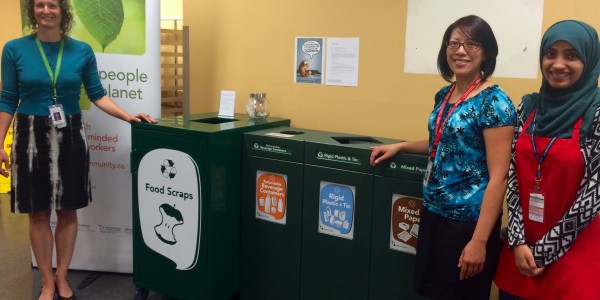RH composing pilot sprouts projects at 12 sites
This past summer, a pilot project focusing on composting, in support of Metro Vancouver’s Food Scraps Recycling Program, was rolled out in Richmond Hospital’s Cafeteria.
The month-long pilot project, sponsored in partnership with Sodexo Food Services and Crothall Environmental Services, was so successful that – in a little more than a month – it will be launched at 12 other sites across VCH, PHC, PHSA and Fraser Health.
Success in Richmond
Sophie Chan, manager, Support Service, at Richmond Hospital worked closely with Sonja Janousek, coordinator, Recycling Renewal, on the project. Education and engagement were integral to making the Richmond pilot project a success.
The week prior to launch, the team shared information about the program with staff by sending out memos and setting up posters around the hospital, advertising the new program in the cafeteria.
During launch week, volunteers were available during peak meal times to act as Organics Recycling Ambassadors to help educate and direct people to the recycling station in the cafeteria.
About RH composting
Food scraps collection bins are located with other recycling bins in the Richmond Hospital cafeteria. Keep your eyes peeled for the bins with graphics to advertise the program. The metal consoles to house the organics bin is specially designed to help control odour and pests.
All raw or cooked food, as well as food-soiled paper products, such as paper plates, paper based take out containers, napkins, and teabags can be disposed of in the Food Scraps bin.
Please make sure that you read the signs on the bins carefully. If you are not sure into which bin your food scraps go, please put the item into the garbage to avoid contamination of our composting bins.
The benefits of composting
- It’s mandated — In January 2015, Metro Vancouver banned food scraps from the garbage stream.
- It’s good for the Environment — Compost has the ability to regenerate poor soil as it is rich in nutrients. This means it can remediate contaminated soil; of which we have a surprising amount. As well, compost prevents methane pollution common with typical landfills. Compost is actually a climate change fighter.
Learn more
To learn more about composting and other Recycling Renewal Program and GreenCare initiatives, check-out the GreenCare Community at www.bcgreencare.ca

